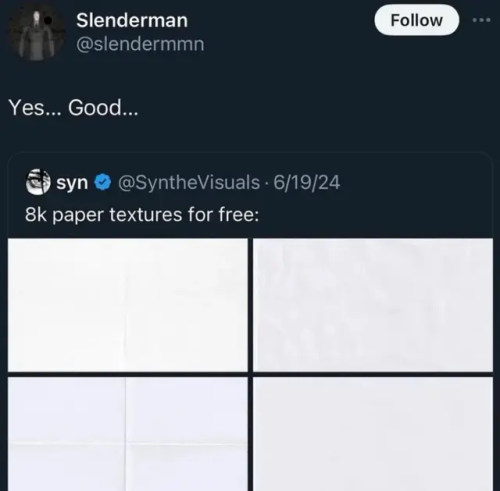"If The Israeli Assault Stopped Today, And We Decided To Hold A Funeral Every Single Day For Each Palestinian
"If the Israeli assault stopped today, and we decided to hold a funeral every single day for each Palestinian killed in the last eight months, it would take us 100 years to honor them all."
The Palestinian speaker at the UN Security Council highlights the devastating toll of casualties among Palestinians resulting from the Israeli genocide in Gaza.
More Posts from Senseihuy and Others
Bee may be very strong and very smart, but she is NOT good at games lol https://pic.twitter.com/U4iBGdY0iG

ok, so I’m a lifeguard, trained and certified, all that pizazz.
And I just wanted to clarify something. CPR alone cannot bring someone back. CPR keeps oxygenated blood flowing through the body, prevented the body from shutting down and the person from going brain dead.
In order for your character to ‘jump’ back alive, there needs to be an electric shock, in a modern au that should normally be an AED and a lot of places have that somewhere in the facility somewhere, and in powered universes you can have an electrically powered person do it.
In fact, its almost more angst-filled to have character A doing CPR, knowing that as the time goes by, without an AED, without EMS getting there, the chances of character B coming back and making a full recovery are getting exponentially lower.
Not to mention CPR is VERY tiring, it’s why lifeguards rotate who is doing the compressions, so if its just character A there to do the CPR, describing the burn of their arms, their back, their muscles all while fighting tears is something that would be very compelling for some readers.


Well fucks? Get to it!

Here's the link to the skeet https://bsky.app/profile/margaretadelle.bsky.social/post/3lgnrffsfa22b
and the course
https://courses.osd.k12.ok.us/collections

au by @kitsuneisi and @xmaruu11 :D


More ways I paint plants! This is how I paint to make my plants look less muddy. I use bolder colors to help me out. Again, this is how I like to go about it! 😀
Searching best practices on JSTOR
Hi Tumblr researchers,
As promised, we're going to dive into some best practices for searching on JSTOR. This'll be a long one!
The first thing to note is that JSTOR is not Google, so searches should not be conducted in the same way.
More on that in this video:
Basic Search on JSTOR
To search for exact phrases, enclose the words within quotation marks, like "to be or not to be".
To construct a more effective search, utilize Boolean operators, such as "tea trade" AND china.
Advanced Searching on JSTOR
Utilize the drop-down menus to refine your search parameters, limiting them to the title, author, abstract, or caption text.
Combine search terms using Boolean operators like AND/OR/NOT and NEAR 5/10/25. The NEAR operator finds keyword combinations within 5, 10, or 25 words of each other. It applies only when searching for single keyword combinations, such as "cat NEAR 5 dog," but not for phrases like "domesticated cat" NEAR 5 dog.
Utilize the "Narrow by" options to search for articles exclusively, include/exclude book reviews, narrow your search to a specific time frame or language.
To focus your article search on specific disciplines and titles, select the appropriate checkboxes. Please note that discipline searching is currently limited to journal content, excluding ebooks from the search.
Finding Content You Have Access To
To discover downloadable articles, chapters, and pamphlets for reading, you have the option to narrow down your search to accessible content. Simply navigate to the Advanced Search page and locate the "Select an access type" feature, which offers the following choices:

All Content will show you all of the relevant search results on JSTOR, regardless of whether or not you can access it.
Content I can access will show you content you can download or read online. This will include Early Journal Content and journals/books publishers have made freely available.
Once you've refined your search, simply select an option that aligns with your needs and discover the most relevant items. Additionally, you have the option to further narrow down your search results after conducting an initial search. Look for this option located below the "access type" checkbox, situated at the bottom left-hand side of the page.
Additional resources
For more search recommendations, feel free to explore this page on JSTOR searching. There, you will find information on truncation, wildcards, and proximity, using fields, and metadata hyperlinks.
-
 chaoticgirl23 reblogged this · 2 weeks ago
chaoticgirl23 reblogged this · 2 weeks ago -
 chaoticgirl23 liked this · 2 weeks ago
chaoticgirl23 liked this · 2 weeks ago -
 hot-shot-0w0 reblogged this · 2 weeks ago
hot-shot-0w0 reblogged this · 2 weeks ago -
 hot-shot-0w0 liked this · 2 weeks ago
hot-shot-0w0 liked this · 2 weeks ago -
 tammysblog06 reblogged this · 3 weeks ago
tammysblog06 reblogged this · 3 weeks ago -
 tammysblog06 liked this · 3 weeks ago
tammysblog06 liked this · 3 weeks ago -
 shadesofhappy reblogged this · 3 weeks ago
shadesofhappy reblogged this · 3 weeks ago -
 davidjack2134331 liked this · 3 weeks ago
davidjack2134331 liked this · 3 weeks ago -
 ahmadahmadallouh32 reblogged this · 3 weeks ago
ahmadahmadallouh32 reblogged this · 3 weeks ago -
 mazukankanon liked this · 3 weeks ago
mazukankanon liked this · 3 weeks ago -
 verwirrteschnecke reblogged this · 3 weeks ago
verwirrteschnecke reblogged this · 3 weeks ago -
 willow-21 reblogged this · 3 weeks ago
willow-21 reblogged this · 3 weeks ago -
 chinchilla-7 reblogged this · 3 weeks ago
chinchilla-7 reblogged this · 3 weeks ago -
 chinchilla-7 liked this · 3 weeks ago
chinchilla-7 liked this · 3 weeks ago -
 shadowflame84 reblogged this · 3 weeks ago
shadowflame84 reblogged this · 3 weeks ago -
 ultrabreezy reblogged this · 3 weeks ago
ultrabreezy reblogged this · 3 weeks ago -
 ultrabreezy liked this · 3 weeks ago
ultrabreezy liked this · 3 weeks ago -
 rainbowsandcoconut liked this · 3 weeks ago
rainbowsandcoconut liked this · 3 weeks ago -
 mcfallen-god reblogged this · 3 weeks ago
mcfallen-god reblogged this · 3 weeks ago -
 mcfallen-god liked this · 3 weeks ago
mcfallen-god liked this · 3 weeks ago -
 valaraukars liked this · 3 weeks ago
valaraukars liked this · 3 weeks ago -
 dipperpinesthemanlyman reblogged this · 3 weeks ago
dipperpinesthemanlyman reblogged this · 3 weeks ago -
 sadtrashbabey liked this · 3 weeks ago
sadtrashbabey liked this · 3 weeks ago -
 biblionerd07 reblogged this · 3 weeks ago
biblionerd07 reblogged this · 3 weeks ago -
 pieceofmanju reblogged this · 3 weeks ago
pieceofmanju reblogged this · 3 weeks ago -
 turbulentquasarsphere reblogged this · 3 weeks ago
turbulentquasarsphere reblogged this · 3 weeks ago -
 bravestartingwithyou liked this · 3 weeks ago
bravestartingwithyou liked this · 3 weeks ago -
 bringbacknaptime reblogged this · 3 weeks ago
bringbacknaptime reblogged this · 3 weeks ago -
 undercovercaptain reblogged this · 3 weeks ago
undercovercaptain reblogged this · 3 weeks ago -
 sanswstrk reblogged this · 3 weeks ago
sanswstrk reblogged this · 3 weeks ago -
 sponge3000 liked this · 4 weeks ago
sponge3000 liked this · 4 weeks ago -
 lilehhlilyy reblogged this · 4 weeks ago
lilehhlilyy reblogged this · 4 weeks ago -
 morgueilj reblogged this · 4 weeks ago
morgueilj reblogged this · 4 weeks ago -
 morgueilj liked this · 4 weeks ago
morgueilj liked this · 4 weeks ago -
 challzep liked this · 4 weeks ago
challzep liked this · 4 weeks ago -
 womenbehotfr reblogged this · 4 weeks ago
womenbehotfr reblogged this · 4 weeks ago -
 sillybayo liked this · 4 weeks ago
sillybayo liked this · 4 weeks ago -
 socialist-proshipper reblogged this · 4 weeks ago
socialist-proshipper reblogged this · 4 weeks ago -
 wallflower-be-damned reblogged this · 1 month ago
wallflower-be-damned reblogged this · 1 month ago -
 wallflower-be-damned liked this · 1 month ago
wallflower-be-damned liked this · 1 month ago -
 ociels liked this · 1 month ago
ociels liked this · 1 month ago -
 halamushtaha reblogged this · 1 month ago
halamushtaha reblogged this · 1 month ago -
 halamushtaha liked this · 1 month ago
halamushtaha liked this · 1 month ago -
 halamushtaha reblogged this · 1 month ago
halamushtaha reblogged this · 1 month ago



